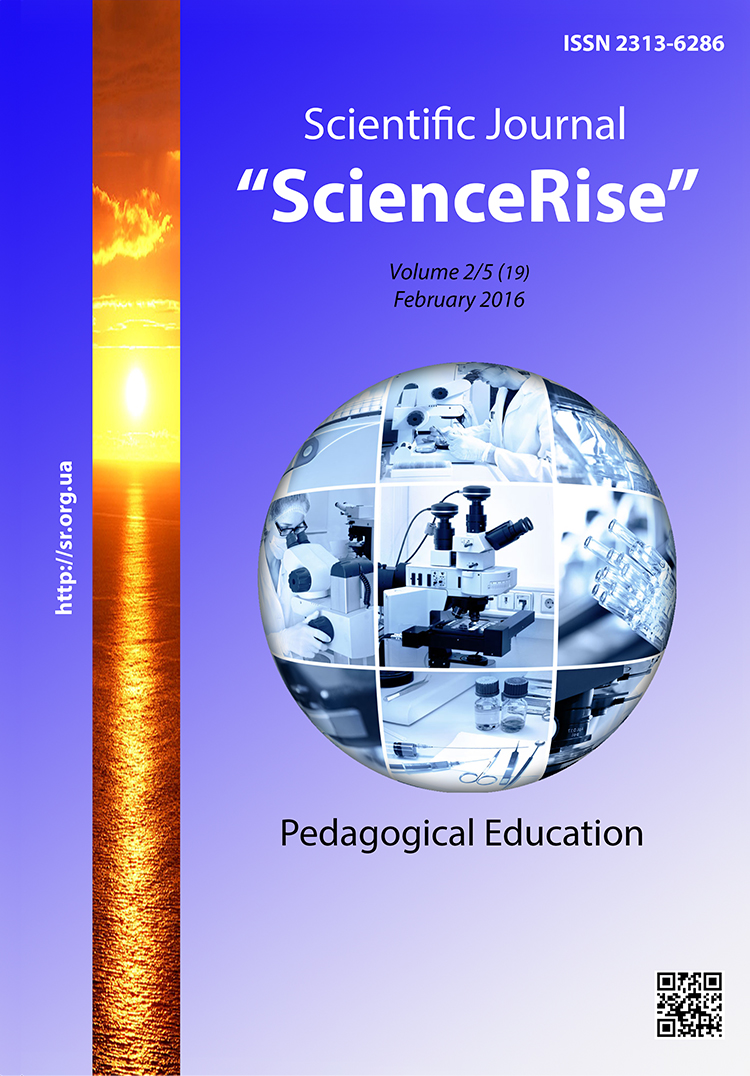Специфіка впливу музично-виконавської діяльності на формування професійно ціннісних орієнтацій студентів музичних спеціальностей
DOI:
https://doi.org/10.15587/2313-8416.2016.61042Słowa kluczowe:
музично-виконавська діяльність, професійно ціннісні орієнтації, студенти музичних спеціальностейAbstrakt
У статті розглядаються можливості впливу музично-виконавської діяльності на формування професійно ціннісних орієнтацій майбутніх педагогів-музикантів. Вирішення зазначеної проблеми можливе за рахунок: використання у цьому процесі найкращих зразків різних видів і жанрів світового й національного музичного мистецтва, постійного вдосконалення музично-виконавської майстерності та інтерпретації творів, а також включення майбутніх фахівців у концертну практику
Bibliografia
Losev, I. V. (1995). Istoriya i teoriya svitovoy kultury. Evropeyskiy kontekst [History and theory of world culture. The European context]. Kyiv: Libid’, 224.
Sohor, A. N. (1980). Voprosy sociologyi i estetiki musiki. Chep. 1 [Issues of sociology and aesthetics of music. Chep. 1]. Leningrad: Soviet Composer, 295.
Nazaykinskiy, Y. V. (2003). Stil I zhanr v musike [Style and genre in music]. Moscow: VLADOS, 248.
Cherednichenko, T. V. (1988). Sovremennaya estetika musikalnogo iskusstva [The modern aesthetics of musical art]. Moscow: Soviet Composer, 320.
Lee, C. (2012). Structure of Foreign Musical Students Professional and Value Orientation. European Researcher, 37 (12), 2231–2238.
Kagan, M. S. (1974). Chelovecheskaya deyatelnost’ [Human activity]. Moscow: Politizdat, 328.
Zakharov, V. K.; Myronjuk, O. G., Glushych, O. D. et. al (1997). Shlyahi ekonovichnogo vyhovannya specialistiv u cilisnomu procesi ih pidgotovky u vuzi kultury [The economic education specialists in the holistic process of their preparation in the University culture]. Questions Of Cultural Studies, 15, 50–58.
Grigoriev, V. (1991). Nekotorie cherty pedagogicheskoy sistemy D. Oystraha [Some features of the pedagogical system of D. Oistrakh]. Music Performance and Pedagogy. Moscow: Musica, 5–35.
Erjemsky, G. L. (1993). Zakonomernosti i paradoksy dirizhirovaniya [The patterns and paradoxes of conducting]. Sankt-Peterburg: Dean, 263.
Kogan, G. M. (1977). U vrat masterstva [At the gate of mastery]. Moscow: Soviet Composer, 176.
Mozgalyova, N. G. (2003). Do pytannya pro motivaciu muzichnogo mislennya maybutnih uchiteliv muziki [To the question about the motivation of musical thinking of the future teachers of music]. Creative personality of the teacher: problems of theory and practice, 10, 196–201.
Cagarelli, U. A. (1989). Psihologiya musikalno-ispolnitelskoy deyatelnosti [Psychology of musical performance]. Leningrad, 31.
Davidov, N. A. (2000). Do slovnyka muzichnoyi pedagogiki [In the dictionary of music education]. Music Art, 14, 144–155.
Korredor, H. M. (1960). Besedy s Pablo Kalzasom [Conversations with Pablo Casals]. Leningrad: Music, 105–258.
##submission.downloads##
Opublikowane
Numer
Dział
Licencja
Copyright (c) 2016 Олександр Сергійович Плохотнюк

Utwór dostępny jest na licencji Creative Commons Uznanie autorstwa 4.0 Międzynarodowe.
Our journal abides by the Creative Commons CC BY copyright rights and permissions for open access journals.
Authors, who are published in this journal, agree to the following conditions:
1. The authors reserve the right to authorship of the work and pass the first publication right of this work to the journal under the terms of a Creative Commons CC BY, which allows others to freely distribute the published research with the obligatory reference to the authors of the original work and the first publication of the work in this journal.
2. The authors have the right to conclude separate supplement agreements that relate to non-exclusive work distribution in the form in which it has been published by the journal (for example, to upload the work to the online storage of the journal or publish it as part of a monograph), provided that the reference to the first publication of the work in this journal is included.

